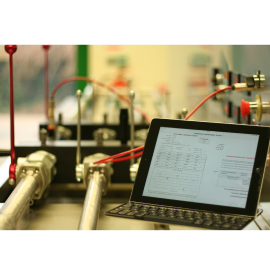- Calibration Services

Hydrotechnik UK have unveiled a major new addition to their existing calibration department. A brand new £100,000+ flow test rig enabling Hydrotechnik to offer full in house flow meter recalibrations traceable to National Standards.
The new rig runs on oil, a major advantage for its hydraulic, lube and diesel use customers. The oil’s viscosity is adjusted from 15 to 100cst with 32cst being the norm. A 5 point calibration is standard although 10 or more points throughout the measuring range can be performed on request. The rig has a flow range of 0.05L/min up to 700L/min and has 2 master flow meters giving a maximum uncertainty of +/-0.5%
Hydrotechnik have created a dedicated in-house laboratory room which caters for Flow, Pressure, Temperature and Oil Particulate sensors as well as instrumentation calibrations, re-calibrations and repairs. Pressure sensor calibration is from 0 – 1,200 Bar and Temperature from -50 to 200°C, all traceable to UKAS standards.
Michael Sharpe - calibration Service Manager at Hydrotechnik UK and Andrew Biggs –Technical Director at UK Flowtechnik Ltd provide an insight into the importance of an effective re-calibration regime:
What is calibration?
Calibration is a testing procedure used to make sure that the current tolerance, accuracy and functionality of a sensor such as pressure, flow and temperature sensors are within acceptable parameters.
Why is it so important?
Re-calibration is an important periodic procedure as it ensures that a given sensor is producing reliable, safe and trustworthy results traceable to a known National Standard.
How often should I calibrate?
As Andrew points out “there is no one universal rule that dictates how often an instrument or sensor should be calibrated”, there are, however, some broad factors that should be considered:
- If correctly used a flowmeter with mechanical parts may be best calibrated on a on a time used basis as wear is the most significant attributor to changes in calibration
- Electronic devices like a pressure or temperature sensors for instance can also have electrical degradation so a periodic calendar calibration may be more appropriate.
- You should always compare the results of the calibration to the previous set, if there has been no appreciable change then perhaps calibration interval can be extended, conversely if there has been a significant change then you can look at how the sensor is used and or a reduction in calibration interval to meet your needs.
- It always worth considering calibration before a demanding measuring project – when accuracy is paramount, for example in R&D to ensure a product passes certain tests and regulations before it can go to market. A calibrated and trusted sensor can then be relied upon to provide accurate test results
- If a sensor has taken a knock or undergone a strenuous series of tests it can be prudent to re-calibrate it to make sure it's accuracy is still intact.
- Calibration interval is best determined by you, if it is out of calibration what’s the cost in failed components, lost production or product recalls. If in doubt, get it calibrated, the cost will be less than losing a customer.
Calibration regulatory bodies
The leading calibration regulatory body in the UK is UKAS who certify organisations who meet set guidelines. UKAS examine both the organisation’s equipment and the procedures carried out to calibrate instruments. Similar bodies exist across Europe such as DKD in Germany.
What Hydrotechnik UK can offer
Hydrotechnik UK have invested in a range of UKAS and traceable calibration equipment. From our temperature controlled flow meter testing rig to a new dead weight pressure tester and state of the art temperature bath.
Michael oversees day to day calibration at Hydrotechnik UK and recognises the benefits of new equipment, “the new equipment enables us to accurately calibrate flow meters, pressure, temperature, analogue & digital gauges, displays and data loggers to national, UKAS and DKD traceable standards”.
Providing this service in-house enables Hydrotechnik UK not only to meet its own and its sister companies calibration needs but to meet customers’ expectations for a cost-effective service and quick turn around on critical projects.
In addition, Hydrotechnik can offer instrumentation repairs and functionality checks and, through its sister company Filtertechnik offer particulate monitor/tester
re-calibrations.
For competitively priced and accurate calibration with a rapid turnaround freephone Hydrotechnik UK on 0800 068 4134 or download our brochure: www.hydrotechnik.co.uk/calibration-services.
Andrew Biggs and Michael Sharpe have a combined 30 year’s experience calibrating hydraulic test and measurement equipment.
